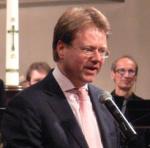
Comunidad de Sant'Egidio, Bélgica
|
Excellencies, ladies and gentlemen, dear friends
The panel that is gathering with us this afternoon is dedicated to one particular country, Nigeria. Welcome to all of you, and thank you for your interest in this topic. In a world with so many ongoing conflicts and wars, why dedicate, during this conference, a particular panel to this theme? Of course, first of all, because we have very eminent participants in this Peace Meeting coming from this important country, and I am happy to welcome the panelists: his royal highness Mohamed Sambo Haruna, emir of Wase; his Grace Ignatius Kaigama, archbishop of Jos and president of the Nigerian bishops conference; one of the major European experts on Nigeria, professor Marc-Antoine Pérouse de Montclos; and Mohamed Ashafa and James Wuye, known also as the Imam and the Pastor, both from Kaduna – welcome to all of you. Welcome also to His Eminence, Cardinal Onaiyekan, and other VIP-participants.
There is a second reason why it is right to have a particular program on Nigeria, within the wider context of this conference: Nigeria is an important country in the West-African region, and I would say, in the whole of Africa. Nigeria is often referred to as African’s giant, and in many senses it is: I would just like to recall that this country is Africa’s most populated country, with more than 170 million inhabitants (nobody really knows the real figure); this is a huge number: one out of every five people living in sub-Saharan Africa is a Nigerian; Nigeria’s GDP this year surpassed that of South African, becoming the top economy of Africa (even if many questions are raised about how this GDP is calculated, and even if the Nigerian economy heavily depends on its oil resources); and I would also like to mention the many Nigerians living overseas, from the UK, to Atlanta and China, even in this country and this city, shaping an interesting and sometimes effective network. Moreover, Nigeria, a country filled with churches and mosques, has a reputation for being one of the most religious countries, with atheists making up less than one per cent of the population.
Yet, this thriving and developing Nigeria is passing through a very troublesome and violent phase of its history. In the northeast, the extremist group Boko Haram, which turned violent and reckless after the unlawful assassination of its founder, Mohamed Yusuf, in July 2009, is terrorizing the population and has conducted suicide attacks causing loss of human life and destruction, in many parts of the country, including the capital, Abuja. The group, set on the creation of an Islamic state, targets from time to time Christian churches, but not only; it also is responsible for a lot of casualties among Muslims. This has been an ongoing story, but it was only the abduction of almost three hundred school girls in the remote town of Chibok in April of this year that received world-wide attention. Meanwhile, Boko Haram has developed from a local group with a local agenda into a cross-border phenomenon, destabilizing parts of northern Cameroun, Niger and the region of Lake Chad, and probably linking up with other terrorist and jihadist groups in northern Africa and beyond. In recent years we have seen a growing destabilization of that part of Africa between the tenth and the twentieth degree parallel north latitude, from west to east: from Mali, Niger, across northern Nigeria, northern Cameroun, Chad, South Sudan, to Somalia, Kenia, and more to the south, the crisis in the Central African Republic. This destabilization has increased after many weapons were flown in from Libya after the destitution of the regime of Muammar Khadafi. In this regional hotspot, the position and stability of Nigeria, which also has the most powerful army in the region, is pivotal.
Of course, when we speak about Nigeria, and the tunnel of violence, we should not only look at Boko Haram, but also at the many violent clashes which often occur among different ethnic groups, especially between Fulani herdsmen and local farmers, in the State of Plateau and Kaduna, but not only there. This is often seen as a conflict between Muslims and Christians, but the reality on the ground is often far more complex.
What will be the future of Nigeria? How can the exit out of the tunnel of violence be found? And how can peace and justice be restored? Before giving the floor to our panelists, who have more expertise than I do, I want to say something personal about Nigeria, especially to the non-Nigerians in this hall. In the Western media Nigeria is often referred to negatively: it is seen as the home of many evil things, like terrorism, violence, corruption, fraud, crime, and so on… All this might be true to some extent, but it is still a partial vision. Having visited Nigeria many times, I’ve also learned to appreciate an interesting nation, with many young, dynamic, friendly, and creative people; often living well together among people with different ethnic background, Muslims and Christians alike, maybe struggling in daily life, but also preparing a better future for themselves and their country. This is also the goal of the many young men and women who are committed, with Sant’Egidio, to build a better Nigeria. For me Nigeria is also an interesting laboratory on how, in this era of globalization, a better future for Africa can be found.
|

